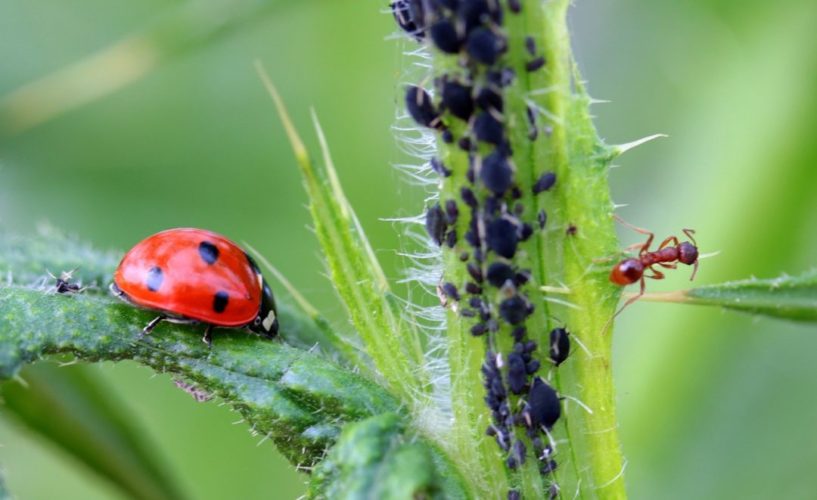In controlling aphids, you must first identify that you have aphids. Once identified, you will now need to address the issue to prevent further infestation and damage to your crops.
You might be able to contain the infestation by spraying the aphids off the plants with a hose. If you don’t mind getting your hands dirty, small infestations can be wiped out by hand.
Prevention
The best approach to good vegetable production is to prevent pest and disease attack rather than trying to cure it. For this you need to ensure a healthy soil and stable environment for plants to grow in. The main way in which this is done is to promote diversity.

Work with nature and copy the natural ways in which plants grow. Insects and “weeds” are a part of nature.
We can encourage those insects and plants that help us in the garden. Ladybirds, praying mantis, lacewings, wasps, frogs, lizards and birds all eat the insect pests that harm our gardens. If you leave these natural predators in your garden, they will help you.
It is also possible to mix vegetables with other plants, particularly strong smelling plants that deter pests and attract predators. Camphor, mints, scented pelargoniums, feverfew, African wormwood, pyrethrum, southernwood, lavender, rosemary, sage and many other herbs have spicy/bitter scents rather than sweet ones. They can also be used as aphid-repelling mulch, by spreading the leaves around newly planted seedlings.
You can use plants as trap plants: nasturtiums for example, attract aphids away from other plants because they are more attractive to the pests.
When actively growing amongst desirable crops, these herbs can confuse pest insects by masking attractive scents. Marigolds and garlic chives are also insect repellents.
Treatment
There are home-made sprays that you can try. If you must use insecticide sprays try to use natural remedies, so that you don’t kill off beneficial insects at the same time. Chemical sprays also break down slowly, so their damage continues for a long time.
Remember that non-toxic insect sprays are used to deter or deflect the pest, or to disturb its breeding cycle. They don’t kill the insects.
Use the following plants in your battle against aphids: aloe leaves, nettle leaves and stems, blackjack seeds, whole marigold plants, rhubarb leaves, whole khakibos plant or tomato leaves. Half fill a bucket with the plant matter, add just-boiled water, stir and leave to stand overnight. Strain out the leaves and stems and add them to your compost. Add 2 tablespoons of dish-washing liquid and mix. The spray will keep for up to a month. Spray onto affected plants every few days, as the herbal insecticide will break down quickly. Be sure to spray the underside of the vegetables as well. Spray the plants and the ground surrounding the plant, as aphids might jump off or sit on the ground until it is safe to attack the plant again.
Another option is the onion and garlic spray: Roughly cut a full pod (including the skins) of garlic and 4 onions. Place in a container. Some suggest adding a tablespoon of crushed, dried or fresh chilli or chilli seeds, or one teaspoon of chilli powder. Pour 3 litres of boiling water over the material, close the container and allow it to stand for one day. Strain and keep the fluid. Add 2 tablespoons cooking oil and 2 teaspoons liquid soap, and mix well. Mix one cup of this mixture with 5 cups of water. Spray weekly, making a fresh batch every week.
Another remedy specifically for aphids is citrus tea. Chop the peels of three oranges or of two lemons and cover with hot water. Leave overnight, take out the peels, microwave the liquid for 5 seconds and store in the fridge. When required, add a teaspoon to 1L of water, 1tsp of dishwashing soap and 1tsp of white spirit vinegar.

